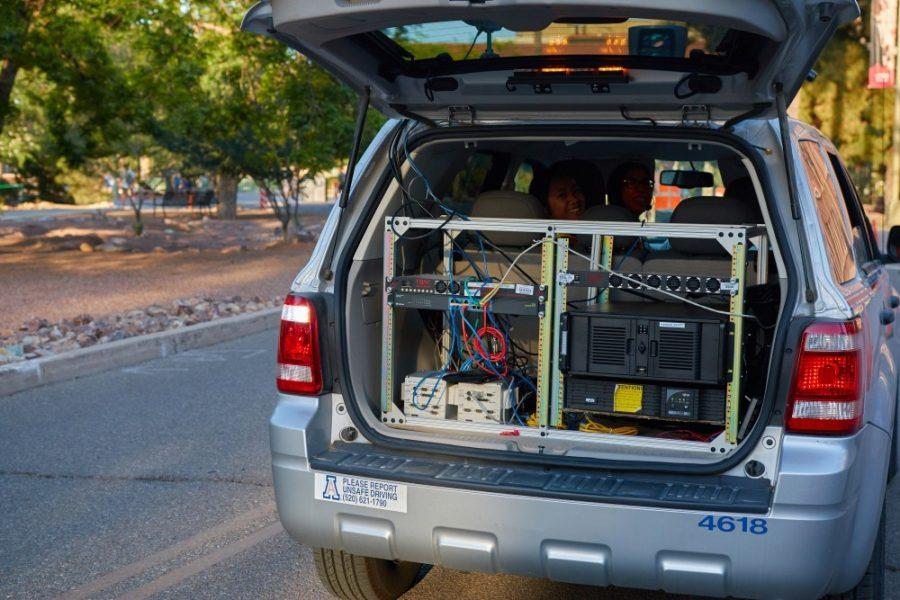Last spring, UA students competed in several competitions brought about by a range of UA departments, with three such events catching our attention.
A self-driving car competition tested young computer engineers from across the globe to program a car to drive itself through an obstacle course, the Rooftop Garden Competition challenged any student willing to try to design an efficient, productive garden to liven up campus and provide food for the community and a candy-counting competition sought to teach engineering and information undergrads how to cooperate and apply their knowledge to create robotic devices.
The self-driving car competition, held April 23-25, brought in students from other countries including Switzerland and Chile, and U.S. states including Missouri and Georgia.
Teams were given a sequence of tasks that got progressively more difficult.
“If students were able to go all the way through, the end result was to have their algorithms that used sensors on the car, that could also control the car and could reproduce the sensed world,” said competition mentor and electrical & computer engineering graduate student Matt Bunting. “In other words, parameterize the 3D world using all the sensors on the car.”
Some teams took the most direct method; they detected and mapped out nearby obstacles and programmed the car to avoid them. The winning team from Switzerland went a step above.
“Their solution was a simulated world in which the car was traveling in,” said competition mentor and electrincal & computer engineering undergraduate Swati Munjal.
The program students were required to use was the Robotic Operating System.
“Not a lot of students were familiar with that operating system, so most of the tutorial requests we got were for that,” Munjal said.
RELATED: Campus Guide ’17: What makes Tucson a great science city?
In the Skittle-counting competition, students from courses BME 210 and ISTA 303 came together to design devices capable of counting and sorting Skittles.

“There’s this huge gap between learning individual skills and making them work,” said mentor and assistant professor at the School of Information Peter Jansen. The competition was designed with applying everything students have learned into one project.
“The fastest design was a free-fall skittle sorter, so it detected the colors of the skittles as they fall mid-air,” Jansen said. Jansen hopes for the students to have walked away from the competition with a more complete understanding. The competition will likely be held again in the fall.
RELATED: Campus Guide ’17: Net Neutrality should be appreciated, defended
The Rooftop Garden Competition, open to all UA students, required participants to design an efficient, productive garden with limited space on the roof of the Student Union Memorial Center.
“We wanted to make the UA more sustainable and advertise how environmentally friendly we are,” said second place team member and environmental studies undergraduate Rebecca Van Rhee.

The greatest challenge students had to overcome was the weight limit.
“In the beginning there was a weight restriction of 20 pounds per square foot, which was not very much,” Rhee said. Students also struggled with time restraints, with finals having been just around the corner by the time the competition was coming to a close.
“If I can think of one thing I wish I had done more, was put more time and research into it” said finance undergraduate and second place team member Amy Stalkfleet, “But we pulled it together and made a project I’m very happy with.”
Second place team member and microbiology undergraduate Ryan Yamauchi explained “We constantly questioned and challenged each other’s ideas to get the best outcome. We had a wide range of interests and majors, which facilitated strong interdisciplinary collaboration.”
The Rooftop Garden Competition was the first competition organized by the Office of Student Engagement, and was essentially their proof-of-concept. They’re currently planning several more competitions in the fall which students can look forward to, but are not quite ready to disclose what those might be.
“It’s really important in the end that the challenge has an implementable outcome, that it’s important for students to work on something where they can put they’re ideas into practice,” said associate director of student engagement Anne Kurtin.
The Rooftop Garden Competition will be available to compete in next year, and the team behind the self-driving car competition are planning a drone-based competition for the future as well.
Follow William Rockwell on Twitter









